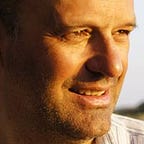How to deal with seniority in a regenerative way: “Senior Ikigaï”
Europe, North America, China, Russia, Japan — amongst others — are getting really old. Really old. Too old to thrive as an economy. Worse, too old to keep the social system afloat. Too many old chaps for too little young crowd paying for them.
It is not new.
We know this for decades, but NEVER dealt with it deeply.
Now, we are facing urgency in which countries lose tally of habitants, where sovereign states are bankrupt facing a multiplied social cost of seniors and connex medical costs.
How to deal with this inter-continental problem in a smart, regenerative way ?
This is our proposal: 4 steps of questioning…
- WHAT: what can I bring to the world, the best of my talent and skills, to a deeply mutating society: what I love to do X what I am skilled X what serves the community X what I can be rewarded for (= Ikigaï). There is no full stop at 65. We can get organized for a nice and coherent continuum, with some adaptations if necessary.
- HOW: which lifestyle, attitude, culture, with which additional skills I could learn, enjoying the present moment and opportunity of life to enjoy, progress and learn, in a new solidarity mode (check out the “Blue Zones” → live 10 years longer, happier, in better health).
- WHERE: in which kind of habitat and social surrounding, with which kind of life (and costs).
- HOW MUCH: revisiting my assets/investments, my spendings, my revenues streams.
Here is a successful example of a “Senior Ikigai”, George M.:
WHAT: I mentor young entrepreneurs, once in a while invest in their activities, build the next generation co-habitat with my community. I also participate in the organization of our community.
HOW: Eat healthy (>50% of our food comes from our own garden), workout regularly, walk in nature several times a week, with a positive optimistic attitude, together with my solidarity community, writing and painting once in a while, whilst learning about new economic models, transition methods, modern philosophers and ancient wisdoms, whilst enjoying the present moment and every single opportunity of life to enjoy, have fun, progress and learn.
WHERE: We bought, with my community, a whole village in northern Spain, and 3 other properties in Brussels (for visiting our families) as well as on the riviera (for holidays), renovated and autonomous in energy, water and (partially) in food, with local waste treatment. Part of the units are rent and pay for over half of the running costs.
HOW MUCH: I invested in a few small businesses I mentor, in the properties, and live in co-everything: carsharing, co-housing, tool-sharing, I also have currencies in timebanks in which I share services, barter what I can, and buy what I can with a local currency we created in the region. I cut 20–25 of my spendings (useless products and services). I share what I can (cutting another 30% of my costs). I barter what I can, and buy second hand. I have some additional revenue streams in local and cryptocurrency. I even have spare money now for some extras and holidays. I live better and happier.
“With a very small starting capital, and a very small retirement money, I live in abundance, healthy and happily, whereas it would be absolutely totally impossible in Brussels” George M.
This work is the result of a true “deep dive” into all dimensions of this historical challenge, done by Katia Parajko, in the context of her university thesis for her studies at MIAS, in the subject of rethinking retirement systems in Belgium.
Katia Parajko, MIAS
Michel A. de Kemmeter, Club of Brussels
